|
|
|
Sort Order |
|
|
|
Items / Page
|
|
|
|
|
|
|
| Srl | Item |
| 1 |
ID:
172831
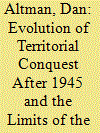

|
|
|
|
|
| Summary/Abstract |
Past studies conclude that a territorial integrity norm caused territorial conquest to decline sharply after 1945, virtually subsiding after 1975. However, using new and more comprehensive data on territorial conquest attempts, this study presents a revised history of conquest after 1945. Unlike attempts to conquer entire states, attempts to conquer parts of states remained far more common than previously recognized. More than conquest declined in frequency, its relationship with war evolved. Challengers attempting conquest before 1945 often initiated a war, then sought to occupy large territories. Today, challengers more often seize small regions, then attempt to avoid war. Adopting this strategy, the fait accompli, challengers increasingly came to target territories with characteristics that reduce the risk of provoking war—such as a low population and the absence of a defending military garrison—but challengers nonetheless take a calculated gamble. In part because seizures of smaller territories with such characteristics have not declined, the operative constraint appears to be against war-prone aggression, not territorial revision. The evolution of conquest is a symptom of war's decline, not its cause. Most of the evidence that the territorial integrity norm suppressed conquest or war withers under investigation with new data. Attempts to get away with seizing small pieces of territory are likely to be a defining element of the twenty-first-century international security landscape.
|
|
|
|
|
|
|
|
|
|
|
|
|
|
|
|
| 2 |
ID:
172829
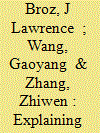

|
|
|
|
|
| Summary/Abstract |
We analyze the factors that increase the likelihood that other nations will follow China's global economic leadership. While our theoretical framework incorporates the conventional argument that China pulls in followers with economic benefits, we focus on grievances with the current global order that have the effect of pushing countries toward the rising new leader. We find that grievances about global financial instability are particularly important push factors. Our results show that countries that have experienced more financial crises, more variable capital account policies, more volatile portfolio capital outflows, and more social unrest during IMF programs are more likely to support China's global leadership than leaders of nations that have been less exposed to these problems. We find no evidence that grievances about global governance, or grievances about discriminatory US trade policies, are related to foreign support for China's global economic leadership. Overall, our evidence is consistent with the interpretation that leaders want to reform and preserve the WTO and the IMF, which have worked reasonably well for them under US leadership. At the same time, they have incentives to follow China's economic leadership on global capital flows, emphasizing long-term infrastructure and development finance over short-term flows which, under the current order, have imposed large costs on many economies.
|
|
|
|
|
|
|
|
|
|
|
|
|
|
|
|
| 3 |
ID:
172833
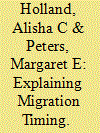

|
|
|
|
|
| Summary/Abstract |
How do migrants decide when to leave? Conventional wisdom is that violence and economic deprivation force migrants to leave their homes. However, long-standing problems of violence and poverty often cannot explain sudden spikes in migration. We study the timing of migration decisions in the critical case of Syrian and Iraqi migration to Europe using an original survey and embedded experiment, as well as interviews, focus groups, and Internet search data. We find that violence and poverty lead individuals to invest in learning about the migration environment. Political shifts in receiving countries then can unleash migratory flows. The findings underscore the need for further research on what migrants know about law and politics, when policy changes create and end migrant waves, and whether politicians anticipate migratory responses when crafting policy.
|
|
|
|
|
|
|
|
|
|
|
|
|
|
|
|
| 4 |
ID:
172834
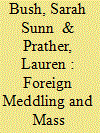

|
|
|
|
|
| Summary/Abstract |
What explains variation in individual preferences for foreign economic engagement? Although a large and growing literature addresses that question, little research examines how partner countries affect public opinion on policies such as trade, foreign aid, and investment. We construct a new theory arguing that political side-taking by outside powers shapes individuals’ support for engaging economically with those countries. We test the theory using original surveys in the United States and Tunisia. In both cases, the potential partner country's side-taking in the partisan politics of the respondents’ country dramatically shapes support for foreign economic relations. As the rise of new aid donors, investors, and trade partners creates new choices in economic partners, our theory and findings are critical to understanding mass preferences about open economic engagement.
|
|
|
|
|
|
|
|
|
|
|
|
|
|
|
|
| 5 |
ID:
172832
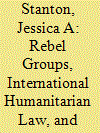

|
|
|
|
|
| Summary/Abstract |
Do rebel group violations of international humanitarian law during civil war—in particular, attacks on noncombatant civilians—affect conflict outcomes? I argue that in the post-Cold War era, rebel groups that do not target civilians have used the framework of international humanitarian law to appeal for diplomatic support from Western governments and intergovernmental organizations. However, rebel group appeals for international diplomatic support are most likely to be effective when the rebel group can contrast its own restraint toward civilians with the government's abuses. Rebel groups that do not target civilians in the face of government abuses, therefore, are likely to be able to translate increased international diplomatic support into more favorable conflict outcomes. Using original cross-national data on rebel group violence against civilians in all civil wars from 1989 to 2010, I show that rebel groups that exercise restraint toward civilians in the face of government violence are more likely to secure favorable conflict outcomes. I also probe the causal mechanism linking rebel group behavior to conflict outcomes, showing that when a rebel group exercises restraint toward civilians and the government commits atrocities, Western governments and intergovernmental organizations are more likely to take coercive diplomatic action against the government. The evidence shows that rebel groups can translate this increased diplomatic support into favorable political outcomes.
|
|
|
|
|
|
|
|
|
|
|
|
|
|
|
|
| 6 |
ID:
172830
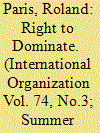

|
|
|
|
|
| Summary/Abstract |
A principal theme of international relations scholarship following the Cold War was the apparent erosion of state sovereignty caused by globalization's integrative effects and the proliferation of international institutions and networks. In recent years, however, scholars have noted a reverse trend: the reassertion of traditional, or Westphalian, state sovereignty. By contrast, I highlight another recent trend that has gone largely overlooked: the reaffirmation of older “extralegal” and “organic” versions of sovereignty by three of the world's most powerful states—Russia, China, and the United States. After tracing the genealogy of these older concepts, I consider how and why they have gained prominence in the official discourse of all three countries. I also explore the implications of this shift, which not only illustrates the importance of “norm retrieval” in international affairs, but also raises questions about the foundations of international order. Contrary to Westphalian sovereignty, which emphasizes the legal equality of states and the principle of noninterference in domestic affairs, the extralegal and organic versions offer few constraints on state action. If anything, they appear to license powerful states to dominate others.
|
|
|
|
|
|
|
|
|
|
|
|
|
|
|
|
| 7 |
ID:
172835
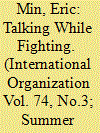

|
|
|
|
|
| Summary/Abstract |
Contemporary studies of conflict have adopted approaches that minimize the importance of negotiation during war or treat it as a constant and mechanical activity. This is strongly related to the lack of systematic data that track and illustrate the complex nature of wartime diplomacy. I address these issues by creating and exploring a new daily-level data set of negotiations in all interstate wars from 1816 to the present. I find strong indications that post-1945 wars feature more frequent negotiations and that these negotiations are far less predictive of war termination. Evidence suggests that increased international pressures for peace and stability after World War II, especially emanating from nuclear weapons and international alliances, account for this trend. These original data and insights establish a dynamic research agenda that enables a more policy-relevant study of conflict management, highlights a historical angle to conflict resolution, and speaks to the utility of viewing diplomacy as an essential dimension to understanding war.
|
|
|
|
|
|
|
|
|
|
|
|
|
|
|
|
|
|
|
|
|